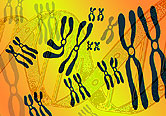Mutations in TEX11 occur in some men with azoospermia with meiotic arrest
THURSDAY, May 14, 2015 (HealthDay News) — Hemizygous testis-expressed 11 gene (TEX11) mutations can cause meiotic arrest and azoospermia, according to a study published online May 13 in the New England Journal of Medicine.
Alexander N. Yatsenko, M.D., Ph.D., from the University of Pittsburgh School of Medicine, and colleagues performed array comparative genomic hybridization testing in blood samples obtained from 15 patients with azoospermia. Mutation screening via direct Sanger sequencing of the TEX11 open reading frame was performed in blood and semen samples from 189 patients with azoospermia and 384 controls.
The researchers identified a 99-kb hemizygous loss on chromosome Xq13.2, which involved three exons from TEX11. The loss was identical in two patients with azoospermia, and predicted a 79-amino acid deletion within the meiosis-specific sporulation domain SPO22. Five novel TEX11 mutations (three splicing and two missense) were identified in subsequent screening. These occurred in 2.4 percent of the men with azoospermia, and were absent in controls with normal sperm concentration (P = 0.003). Five TEX11 mutations were detected in 15 percent of patients with azoospermia who received a diagnosis of azoospermia with meiotic arrest. In these patients, meiotic arrest resembled the phenotype of Tex11-deficient male mice.
“Our finding that TEX11 mutations occurred in infertile men with meiotic arrest is important for the diagnosis of azoospermia and meiotic arrest,” the authors write.
Copyright © 2015 HealthDay. All rights reserved.








